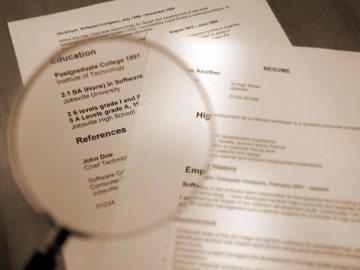Should a Resume Be One Page? 4 Best Ways to Make It Fit

Part of a perfectly crafted resume is listing down a complete job history, including details such as the contacts of former employers that your recruitment managers can refer to and your top achievements per job.
The whole point is building a convincing history file, which begins with outlining and listing your previous jobs so you can further research what you can discuss. However, if you're someone with years of experience, how long should your resume be?
How Long Should a Resume Be?
A good length for a resume is about one to two pages long. It's based on the amount of work experience acquired. A one-page resume should serve you well if you're a fresh college graduate or a professional with some work experience. Conversely, if you've worked for 10 years or more, it makes sense to create a two-page resume.
A one-page resume containing strategic keywords, relevant skills, and achievements helps you land a good impression on recruiters. It also functions as your first contact point with the company you're applying for. Hiring managers review hundreds of job applications, which means they won't be able to read all resume submissions.
The second page might not receive as much attention as the first, so make sure to use the right resume format to help make it stand out. A second page is ideal if you're long ahead in your career and aim to climb the corporate ladder. In comparison, a two-page resume contains more details about work experience and skills employers need.
Remember that when hiring managers and systems review your resume, they also look for reasons to reject your application. Completeness in your resume matter greatly, so keeping it short enables you to highlight your achievements.
Best Ways to Keep Your Resume Short
Here are four tips to help you write a short resume:
-
Highlight your most impressive achievements
Hiring managers only view resumes for a very short time, so you must make yours stand out. Think about your greatest achievements. Did you make any contributions to improve the company culture? Were you awarded for outstanding performance? Were there projects you led that received recognition from other companies?
By highlighting your best achievements, you give yourself a great chance of winning the attention of hiring managers, landing interviews, and possibly getting hired.
-
Be concise
Go straight to the point when writing your resume. Keep your ideas brief by focusing on each sentence's main idea and message. Shorten them, but don't sacrifice their substance. Remember, hiring managers will also review the application of others, so it's important only to share the necessary details on your resume.
You can use bullet points instead of paragraphs to save space and briefly discuss your educational background and experience. Keep them within one to two lines because shorter sentences are easier to read.
-
List down important accomplishments
Instead of covering all the details of your previous jobs, list down the greatest, most relevant accolades. Add numbers and specific achievements to reinforce your success, such as major projects led, sales quotas surpassed, and departments handled.
-
Stay away from Microsoft Word templates
When creating a resume, avoid using Microsoft Word templates. Why? It's because single-page resume templates on Word can appear longer on the hiring manager's computer. It's better to save resume templates in PDF format. Unlike Word documents, PDFs remain the same regardless of who views the file.
Experience is the Best Basis for Building Your Career
Crafting a good resume isn't just about noting every accomplishment you've made. You don't need all the details. Less is more, especially if you're beginning to build your career. What matters is sharing the right and appropriate information.
Career.com can do the same for you. With over 53,000 job openings, you'll find the most relevant career opportunities with the right experience levels in no time.


